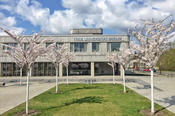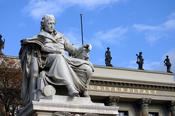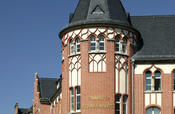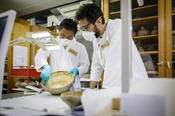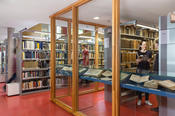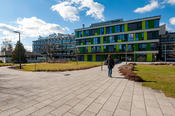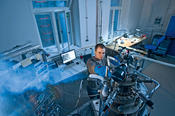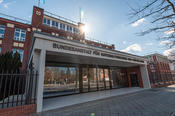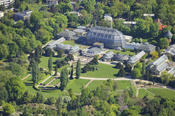Berlin as a Research Hub
Berlin has a large number of outstanding research institutions. Moreover, the region is characterized by a unique culture of cooperation. In addition to the excellent research infrastructure, this is an important foundation for the integrated research environment that the Berlin University Alliance is aiming to create. For the implementation of this ambitious goal, the alliance is receiving roughly 24 million euros annually through the Excellence Strategy of the German federal and state governments. In addition, the Berlin University Alliance is receiving 6 million euros from the State of Berlin through programs of the Einstein Foundation Berlin.
The success of Freie Universität Berlin would be difficult to imagine without the university’s close networking with outstanding research institutions on the research campus in Berlin-Dahlem and beyond. This cooperation includes large third-party funded research projects such as Collaborative Research Centers funded by the German Research Foundation (DFG) as well as support for junior researchers through jointly operated graduate schools and graduate training programs. Another important factor for the success of Berlin as a research hub is the international networking of its research institutions. As an “International Network University,” Freie Universität Berlin has proven to be exemplary in this area.
Strong Partners
Three of the strongest research universities in Germany join forces within the Berlin University Alliance: Freie Universität Berlin, Humboldt-Universität zu Berlin, and Technische Universität Berlin. The partners also include Charité – Universitätsmedizin Berlin, the medical school operated jointly by Freie Universität and Humboldt-Universität and one of the largest university hospitals in Europe. Together they train almost 110,000 students; around 1,600 professors teach and conduct research at these institutions. The diversity of specialist expertise, the excellent research infrastructure, and important collections contribute to the great international appeal of the four partners.
The full range of university research was reflected in the great success of the Berlin institutions in the funding line for clusters in the German Excellence Strategy. Seven of these joint research projects were approved in Berlin, four of them at or with participation by Freie Universität. No other location in Germany was able to attract more clusters of excellence. From artificial intelligence to new materials and catalysis research to the effect of literature through time and space – the range of topics that the involved researchers are investigating is wide. All the clusters are based on cooperation and involve researchers from at least one other partner within the alliance.
Excellent Non-university Research
The Berlin University Alliance partners cooperate in many areas with non-university research institutions in Berlin, which for their part joined forces in 2020 to form BR50 (Berlin Research 50). Scholars and scientists work on a wide range of topics in more than 70 non-university research institutions. In Berlin there are, among others, five Max Planck Institutes and four institutes of the Fraunhofer-Gesellschaft, two research centers of the Helmholtz Association as well as facilities of the German Aerospace Center (DLR), and 14 institutes of the Leibniz Association. In addition, other highly regarded research institutions such as the Berlin-Brandenburg Academy of Sciences and Humanities, the German Archaeological Institute (DAI), and the Prussian Cultural Heritage Foundation have their headquarters in Berlin.
A Berlin Original: The Einstein Foundation
The Einstein Foundation was founded in 2009 by the State of Berlin with the aim of promoting science and research in Berlin at the top international level and establishing Berlin as an attractive location for science and research over the long term. In addition to the proceeds from the foundation’s capital, the foundation has funds from the State of Berlin at its disposal. The projects in the various funding lines are selected by an independent academic commission.
The Einstein Foundation Berlin also supports the work of the Berlin University Alliance by providing additional funds from the State of Berlin for so-called Einstein Research Units (ERU) and by managing the review process. Einstein Research Units are intended to enable long-term research associations in strategically important research fields of the Berlin University Alliance. Applications for Einstein Research Units can be developed in a project funded by the Berlin University Alliance as part of the “Grand Challenges Initiatives” (more information here). The funding amount is usually up to 2 million euros per year, initially for a funding period of up to three years.
Academia and Society
The German capital has a unique density of cultural institutions as well as state and federal political institutions, including theaters, museums, ministries, and foundations. As cooperation partners for the academic institutions, these cultural institutions, along with other partners from business and society, make a significant contribution toward shaping the integrated research environment of Berlin.

